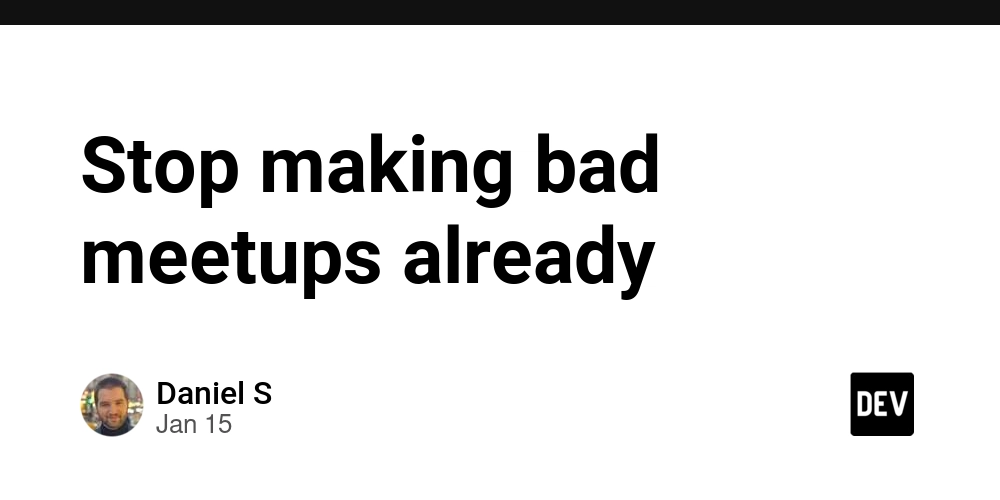Stop making bad meetups already
Offline meetups are getting more and more popular. Remote-first world forces people to look eagerly into offline socialization. Over the last few weeks, I’ve plunged into this world again: networking, startup pitch competitions, public speakers — a whirlwind of events has swept in. Unfortunately, around 70% of this whirlwind is crap. After attending yet another time-wasting event and being amazed once more at how organizers manage to so devotedly ignore all the principles of moderation and common sense, I realized I couldn’t stay silent. Back in the day, I organized and moderated more than a few events of all sorts of formats and sizes. I came up with a bunch of basic principles, and following them is what separates a good event from a bad one. Here they are. 0. The most important thing — moderation Moderation is incredibly important. It’s the crucial thing for any good event. The moderator’s role is the cornerstone: it’s up to them whether people have a good, beneficial experience or just lose a couple of hours of their life. What happens at meetups without moderation: At networking sessions, introverts stare at their phones and leave without opening up or making new connections During pitch sessions, the loudest or boldest participants take all the floor time, leaving everyone else unheard People ask speakers irrelevant questions and waste everyone’s time Speakers get carried away, stray off-topic, and waste time or lose focus A good moderator, like a conductor, guides the event and maintains its quality. But how do you become a good moderator? 1. “Is what’s happening right now beneficial for the participants?” This is the universal question that a moderator should ask themselves every 10 seconds. Is the speaker’s topic relevant to the audience? Maybe they need a subtle hint or nudge? Is the question someone asked truly important for everyone else? Maybe it’s too narrow, and you should politely say “no” and pass the microphone to the next person? During coffee breaks, are people actually getting to know one another or just drifting off into corners? You need to understand who your audience is and why they came to your event. If, at any moment, they’re not getting value and you’re just sitting there too shy to guide the speaker or remind someone they’re over time, you’re effectively destroying your event and squandering dozens (or even hundreds) of human-hours. 2. Introduce people at networking sessions Networking isn’t just about bringing a lot of people together in one place. Networking is about creating a context where it’s easy for them to connect. Ideally, these connections should form between people who can be useful to each other. A good networking event starts with the moderator introducing the participants. Give each person 20–30 seconds for a short intro. Begin with yourself — set the example. Are there too many people? Break them into groups of 8–10, then mix them up and form new circles. Thirty seconds for 10 people is only 5 minutes. But in those 5 minutes, everyone will mentally note who seems interesting and who they’d like to get to know better. Plus, it’s a great conversation starter: “Hey, you do online retail? That’s so familiar — as you heard, I build online stores. Can you tell me more?” is way better than the usual, “Hi, I’m John, what do you do?” Try experimenting: ask people to name the strangest thing about themselves or share their craziest fail. Little confessions like that often make great ground for future conversations. Test out different introduction games that create a relaxed context for chatting. That’s the essence of a networking meetup. Anyone can throw an event on Facebook, but real networking takes a bit more. 3. Keep track of speakers’ stories Not every talk is agreed upon beforehand. That can be great: you can do interviews, field questions from the audience, use lots of formats that let speakers explore topics freely without prepared slides or scripts. Seasoned speakers handle this just fine. But more often, the person is a professional in their field — design, development, management, whatever — and not necessarily a pro at public speaking. They might be nervous, lose their train of thought, go into irrelevant details, or stretch beyond the allotted time. Help them out. Don’t just sit there watching someone flounder while the audience quietly slips away. Yes, cutting in can feel uncomfortable, but it’s necessary: not only the speaker but also the audience (whose valuable time you’re saving) will thank you. There are plenty of ways to do it politely and tactfully: “Alex, this is incredibly interesting, but I’m afraid not many in the room are that deeply familiar with X. You mentioned Y, which I think is more common — could you talk a bit more about how you solved that?” “Marie, you know so much about X, and I’m sure you could talk about it for days. But unfortunately, we only have a couple of h

Offline meetups are getting more and more popular. Remote-first world forces people to look eagerly into offline socialization. Over the last few weeks, I’ve plunged into this world again: networking, startup pitch competitions, public speakers — a whirlwind of events has swept in.
Unfortunately, around 70% of this whirlwind is crap.
After attending yet another time-wasting event and being amazed once more at how organizers manage to so devotedly ignore all the principles of moderation and common sense, I realized I couldn’t stay silent.
Back in the day, I organized and moderated more than a few events of all sorts of formats and sizes. I came up with a bunch of basic principles, and following them is what separates a good event from a bad one.
Here they are.
0. The most important thing — moderation
Moderation is incredibly important. It’s the crucial thing for any good event. The moderator’s role is the cornerstone: it’s up to them whether people have a good, beneficial experience or just lose a couple of hours of their life.
What happens at meetups without moderation:
- At networking sessions, introverts stare at their phones and leave without opening up or making new connections
- During pitch sessions, the loudest or boldest participants take all the floor time, leaving everyone else unheard
- People ask speakers irrelevant questions and waste everyone’s time
- Speakers get carried away, stray off-topic, and waste time or lose focus
A good moderator, like a conductor, guides the event and maintains its quality.
But how do you become a good moderator?
1. “Is what’s happening right now beneficial for the participants?”
This is the universal question that a moderator should ask themselves every 10 seconds.
- Is the speaker’s topic relevant to the audience? Maybe they need a subtle hint or nudge?
- Is the question someone asked truly important for everyone else? Maybe it’s too narrow, and you should politely say “no” and pass the microphone to the next person?
- During coffee breaks, are people actually getting to know one another or just drifting off into corners?
You need to understand who your audience is and why they came to your event. If, at any moment, they’re not getting value and you’re just sitting there too shy to guide the speaker or remind someone they’re over time, you’re effectively destroying your event and squandering dozens (or even hundreds) of human-hours.
2. Introduce people at networking sessions
Networking isn’t just about bringing a lot of people together in one place. Networking is about creating a context where it’s easy for them to connect. Ideally, these connections should form between people who can be useful to each other.
A good networking event starts with the moderator introducing the participants. Give each person 20–30 seconds for a short intro. Begin with yourself — set the example.
Are there too many people? Break them into groups of 8–10, then mix them up and form new circles.
Thirty seconds for 10 people is only 5 minutes. But in those 5 minutes, everyone will mentally note who seems interesting and who they’d like to get to know better. Plus, it’s a great conversation starter: “Hey, you do online retail? That’s so familiar — as you heard, I build online stores. Can you tell me more?” is way better than the usual, “Hi, I’m John, what do you do?”
Try experimenting: ask people to name the strangest thing about themselves or share their craziest fail. Little confessions like that often make great ground for future conversations.
Test out different introduction games that create a relaxed context for chatting. That’s the essence of a networking meetup. Anyone can throw an event on Facebook, but real networking takes a bit more.
3. Keep track of speakers’ stories
Not every talk is agreed upon beforehand. That can be great: you can do interviews, field questions from the audience, use lots of formats that let speakers explore topics freely without prepared slides or scripts.
Seasoned speakers handle this just fine. But more often, the person is a professional in their field — design, development, management, whatever — and not necessarily a pro at public speaking. They might be nervous, lose their train of thought, go into irrelevant details, or stretch beyond the allotted time.
Help them out. Don’t just sit there watching someone flounder while the audience quietly slips away. Yes, cutting in can feel uncomfortable, but it’s necessary: not only the speaker but also the audience (whose valuable time you’re saving) will thank you.
There are plenty of ways to do it politely and tactfully:
“Alex, this is incredibly interesting, but I’m afraid not many in the room are that deeply familiar with X. You mentioned Y, which I think is more common — could you talk a bit more about how you solved that?”
“Marie, you know so much about X, and I’m sure you could talk about it for days. But unfortunately, we only have a couple of hours, so I have to narrow things down a bit: could you focus more on Y — it’s really popular right now?”
Smile, be polite and kind. You’re not a disciplinarian telling someone off for going over time. You genuinely want to help them share their most valuable points with the audience.
There’s nothing sadder than seeing speakers looking dejected at the end of an event, facing a half-empty room. It’s especially hard when people walk out during their talk. “I guess I got carried away with X… Maybe it wasn’t interesting to everyone…” But if there’d been a good moderator, things would have gone smoothly.
4. Moderate questions to the speakers
Some event formats include open questions from the audience. Unfortunately, this is often where moderation fails: people ask super-niche questions relevant only to them, or toxic (passive-aggressive) questions, or weird off-topic questions, or they unload 10 questions at once.
Firstly, for some events, that open format might not be the best fit. Got a pitch session? Put together a solid jury to ask questions and give feedback — not the audience. That ensures you get good, thoughtful, expert questions, and everyone can benefit from the answers.
Okay, so your event format really does require audience interaction? Don’t be afraid to cut or reframe questions:
“Sorry, but I’m afraid that’s too narrow an issue. It’s best if you catch the speaker afterwards and discuss it one-on-one.”
“I’d like to expand your question: I think everyone would be curious not only about X, but about the whole segment in general.”
“Sorry, but we already covered that a bit earlier.”
And so on. An audience is chaos, full of lots of different people. Some struggle to phrase their question, others zone out and ask something that was already explained, etc.
Don’t let your own shyness get the better of you — politely decline or redirect someone’s question and pass the mic. Everyone else in the room will thank you.
Afterword
Moderating an event isn’t difficult at all. Politeness, gentle guiding remarks, helping people open up — these are the main tools of a good moderator. Always keep in mind why people came to your event and continually help them achieve that.
Remember that 15 minutes of wasted time in a meetup of 100 people adds up to a whole person-day lost for nothing.





















